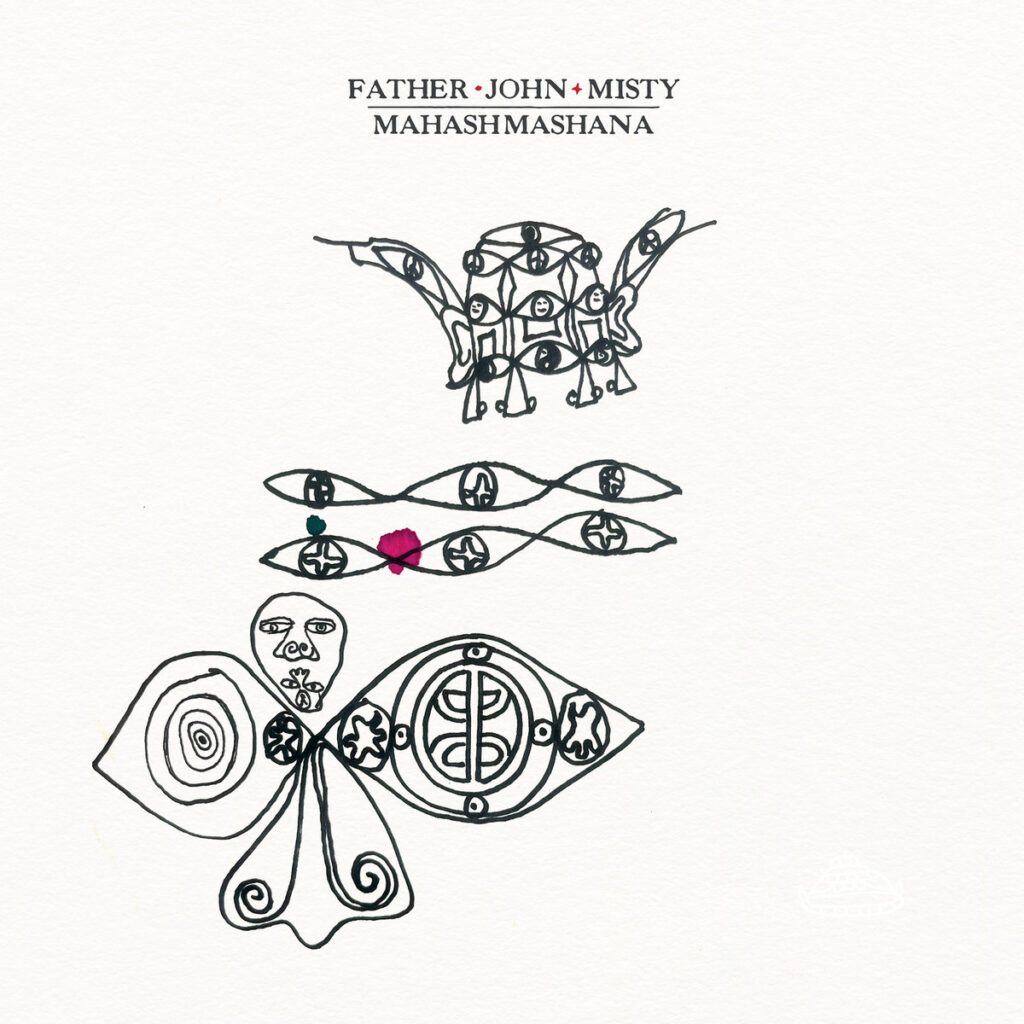
Mistyheads can exhale. The album we’ve been waiting for is here.
For more than a decade, our man J. Tillman has been building a reputation as one of his generation’s most inspired singer-songwriters: a louche and stylish cultural commentator at the intersection of folk-rock and 1970s studio-pop, lacing his songs with lush orchestration and scathing contempt, sparing not even himself. If you worship music’s lineage of vaunted philosopher-poets — listening to podcasts about old Bob Dylan bootlegs, jacking off to lyrics by Leonard Cohen, et al — there’s a good chance Father John Misty is your chosen prophet. That stature is well-deserved; whether serving up savvy societal reckonings or dissecting his own life with a mix of self-loathing and self-regard, Tillman is nearly peerless among the artists updating classic songcraft for a modern audience. Which is why his last album was such a weird hang.
In 2022, FJM emerged from the other side of the pandemic with Chloë And The Next 20th Century, an album that pushed several decades beyond his usual ’70s-centric influences into the realm of big-band jazz and traditional pop. Conceptually, it was clever: retreating to the sounds of the roaring ‘20s for a set of songs about how, here in the future, we’re just repeating the prior century’s mistakes. It was good for Tillman to take a big swing like that to challenge both himself and his listeners, and after zeroing in on his own problems while perfecting his shtick with 2018’s masterful God’s Favorite Customer, an aesthetic left turn was the right move. But a fascinating creative exercise does not necessarily equate to a satisfying listen. None of it worked as well as the apocalyptic closing track “The Next 20th Century,” which tapped back into the Father John Misty wheelhouse with spectacular results.
For Tillman, Chloë was a fun chance to try something well outside that wheelhouse. “Part of the reason making the last album was so gratifying is that I didn’t really know what I was doing, or why I was doing it,” the formerly prolific pullquote machine told Blackbird Spyplane in one of his increasingly rare interviews. “It was an album full of these alternate-timeline American-songbook tunes, and on its face it’s pleasant music, but there’s also this unsettling undercurrent to it. I think it’s OK to listen to that album and say, What the hell is this? It’s an outlier.”
Mahashmashana, out this Friday, is the best kind of return to the mean. The album is a showcase for everything Father John Misty does well. The lyrics are bitingly funny and occasionally heartbreaking; the song structures earn their luxurious sprawl; the melodies are built to imprint themselves on your soul. Most notably, the arrangements are staggeringly beautiful, elevating many different kinds of Father John Misty songs into something like audio cinema. Tillman’s catalog is already too accomplished to yield a consensus favorite, but this album will instantly become a popular choice in those debates. It’s among his absolute best.
Tillman spends much of Mahashmashana, named for a Sanskrit word meaning “great cremation ground,” in big-picture mode, taking stock of the human condition. He’s not often obviously singing about his own life, as he did throughout the personal breakdown chronicle God’s Favorite Customer, except where it’s spelled out, like the bit on “I Guess Time Makes Fools Of Us All” about how Rolling Stone told him he’s “easily the least famous” person to turn down the cover. The one clear burst of autobiography is “Josh Tillman And The Accidental Dose,” a sort of sequel to I Love You, Honeybear highlight “The Night Josh Tillman Came To Our Apartment” set during his drug-fueled burnout a few years back. “She put on Astral Weeks/ Said, ‘I love jazz,’ and winked at me,” Tillman begins. “This is the last place I oughta be/ But I can’t drive and I sure can’t sleep.” The verse is clearly set in the past tense, written from the perspective of someone who has moved past a dark phase, yet its mantra-like chorus suggests the healing can never be total: “All the king’s horses, all the king’s men/ You may never be whole again.”
More often, he zooms out to survey that brokenness on a more universal scale, with a widescreen soundtrack to match. Tillman, who has spent adulthood fleeing his strict evangelical upbringing, has often trained his cynical eye on humanity’s desperate search for meaning and a god he views as either inept, uncaring, or imaginary. On Mahashmashana, that drama plays out in the context of sprawling epics worthy of their subject matter. The nine-minute title track swirls together the cosmic, the geopolitical, and the interpersonal into a gilded state-of-the-species address, bleakly concluding that “A perfect lie can live forever/ The truth don’t fare as well.” The apocalyptic ballad “Screamland” mirrors that song’s hopelessness and grandiosity; every repetition of “Love must find a way” drips with pity as Tillman stitches together expertly crafted scenes of delusion.
Tillman saunters out of the darkness for the live-band disco odyssey “I Guess Time Just Makes Fools Of Us All,” but the song’s Dylan-esque collage of images continues to operate at a gargantuan scope. “Our naked bodies go on trial/ Just for laughing at the joke,” Tillman sings, “Just for saying of the bargain/ What any sales girl already knows.” It’s one of many moments on the album when Tillman fixates on the ways we try to cover our brokenness with platitudes, ceremony, and shared cultural narratives. “Roll the stone away/ I want to go/ Where everyone is perfect beneath their robes,” he proclaims on “Screamland.” On “Being You,” he digs even deeper: “Under the skin we’re not much on the eyes/ A real mess where soul must reside.” It’s a song about not quite knowing how to be human, about feeling disconnected from yourself and society on a fundamental level, but playing along with the pleasantries because what else can you do? Tillman remains an expert at sculpting these raw, vulnerable sensations into finely crafted turns of phrase, a parade of images and ideas too oblique to pin down but vivid and insightful enough to stir those deep parts of you he’s interested in uncovering.
This grand anthropological theater has a consistently breathtaking soundtrack. Tillman’s longtime co-conspirator Jonathan Wilson, who co-produced every prior Father John Misty album, remains in the picture and is credited as an executive producer. But producer credit goes to Tillman and Drew Erickson, the orchestral arranger who worked on Chloë and projects by Misty contemporaries like Lana Del Rey and Tim Heidecker. Erickson shows out here. His contributions elevate every track. Even the album’s one true rock song — the hard-charging, hip-shaking, cowbell-addled “She Cleans Up” — is outfitted with artful symphonic outbursts. Most of the time, the music is more like an elegant swoon, gorgeous and larger than life. The strings, brass, and woodwinds are as crucial to the fabric of the album as David Campbell’s work on Beck’s Sea Change or Jonny Greenwood’s arrangements for Radiohead’s A Moon Shaped Pool — and every bit as beautiful.
The result is something like a second stab at the brilliant but bloated Pure Comedy, this time sharper, savvier, and trimmed to the essentials. That feels like an odd assessment of an album with multiple eight-minute songs and none under four, but Mahashmashana makes its excess count. The strange aesthetic trappings of Chloë obscured how much Tillman has grown as a writer in recent years. With the possible exception of the undercooked “Mental Health,” his satire has evolved beyond obvious crowd-pleasers like “Total Entertainment Forever,” with its opening provocation about “bedding Taylor Swift every night inside the Oculus Rift,” into something more elliptical and oblique but no less piercing. Those seeking a bearded bard to dissect, interpret, and debate will be richly rewarded, and those inclined to call bullshit on Tillman may still be bowled over by sheer sensory delight. I don’t know if you should give up hope, holistically speaking, but if you’ve been anxiously awaiting Father John Misty’s next masterpiece, your faith has been rewarded.
Mahashmashana is out 11/22 on Sub Pop/Bella Union.



